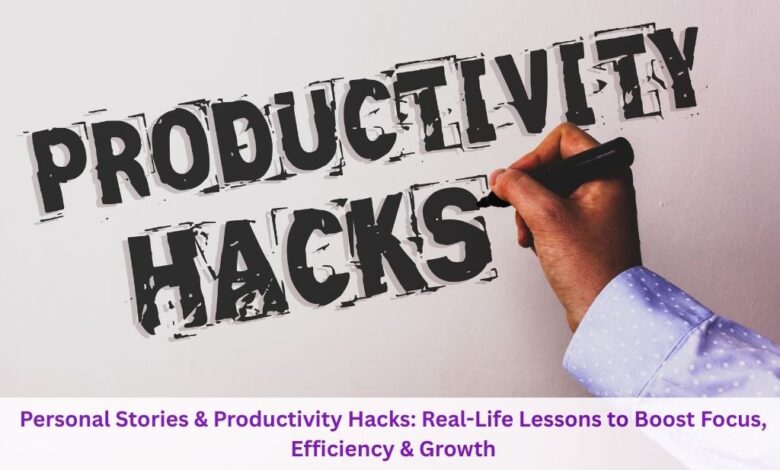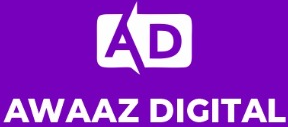Personal Stories & Productivity Hacks: Real-Life Lessons to Boost Focus, Efficiency & Growth

Preface
In 2025, people are more determined than ever to find productivity hacks, time operation tips, concentration methods, diurnal routines, ways to beat procrastination, deep work, and work-life balance. Everyone wants a further affair with lower stress. Using trending keywords like productivity, focus, robotization, habit structure, thing setting, time-blocking, awareness, deep work, and energy optimization helps papers show up in quests because that’s what people are codifying into Google.
This composition dives into productivity hacks with particular stories showing not just what works in proposition, but what works in real life. You’ll see how small changes in routine, mindset, tools, or opinions made big differences. My stopgap is you take away hacks you can try at the moment, with evidence they’ve helped someone differently, so you feel inspired to take action.
- Prioritize Deep Work by Time-Blocking & Saying “No “What’s Deep Work & Time-Blocking?
Deep work means ages when you work on demanding tasks without interruptions. Combine that with time-blocking ,scheduling gobbets of time simply for focused tasks. Also, cover that time by saying “no” to lower precedence requests or distractions. Personal Story How Blocking Mornings Changed My Affair A long time back, I was juggling freelance systems, part-time work, and content creation. Mornings were chaos: dispatch after dispatch, meetings, and arbitrary tasks.
I decided to block 9-11 AM as deep work time. No emails, no messaging, just work on my most important task. For the first week, I plodded. But by week two, I saw that I was completing bigger tasks in those two hours than I used to in a whole morning. My affair doubled, stress dropped, and I felt more in control. How to Apply It & Why It Works Identify your most productive hours (for numerous people, early morning).Pick 1-2 hours for deep work daily. Record them in your timetable and treat them like movables.
Before agreeing to anything new, ask, “Will this help me reach my main pretensions?” If not, consider pushing it back or saying no.Use tools like timetable apps, Do Not Disturb mode, or apps that block distracting websites. This hack helps because by reducing environment switching (jumping between tasks), you conserve internal energy. Your focus stays sharper. You finish better work more efficiently.
- Use the “two-nanosecond rule.” Habit moldingWhat They Are Two-nanosecond Rule
If a task takes two twinkles or less, do it incontinently. Rather than delaying small tasks, you clear them at once. Habit Stacking Link a new habit to an existing one. For illustration, after you brush your teeth (being a habit), you spend two twinkles planning your day (a new habit).Personal Story: From Overwhelmed Inbox to Zero by Two Twinkles My inbox used to be a wreck. Dozens of unlettered emails, small tasks lurking, and monuments I kept delaying. Also, I started doing “two-nanosecond clean-ups” after each work session, reply, or library anything I could in two twinkles.
Brace that with morning planning after morning tea (formerly a habit), and I’d plan my three most important tasks for the day. A week in, my inbox was under control; I felt less anxious; tasks didn’t sneak up on me.How to Apply It Make a list of quick tasks (“reply short dispatch,” “schedule meeting,” “upload print”) and commit to doing them as soon as they come in or during natural breaks.
Choose a routine (after breakfast, after coffee, or after lunch) and attach one new habit you want to make (brief planning, stretching, or reviewing pretensions).Use monuments or habits.- shamus apps to support thickness. These hacks work because they reduce procrastination, help small tasks from piling up, and make bigger pretensions less intimidating. The small triumphs make instigation and boost provocation.
- Influence robotization & tools to reduce repetitious work.
Robotization means letting technology handle repetitious tasks, scheduling, monuments, dispatch templates, workflows, reports, social media advertisements, etc. The right tools can free up hours every week.
Personal Story How Automating Social Media Gave Me Back My Gloamings When I started promoting content regularly, social media scheduling consumed hours. I’d manually post on different platforms every day. I switched to a tool that posts in batches and indeed reposts high-engagement content after a set interval. I also set up dispatch templates for common queries. As a result, I saved 6 hours a week. Gloamings came mine again.
My content’s thickness improved without redundant collapse. How to Apply It Identify repetitious tasks in your workflow: advertisement, emailing, monuments, and data entry. Find suitable tools. cataloguing apps, dispatch templates, timetable robotization, Zapier or IFTTT, and workflow tools. Start small and automate one task first.
Test it, tweak it. Examiner to ensure you’re not losing quality or personalization (robotization works best for routine, not core creative work).When you automate, you reduce cognitive cargo. Your brain isn’t detracted by small chores. You can concentrate more on creative, strategic, or high-value work.
- Build Energy Routines Rest, Breaks, Mindfulness
Why Energy Matters More Than Time You can record your day impeccably, but if you’re running low on internal & physical energy, productivity drops. Routines that include rest, breaks, awareness, or movement are essential. Personal Story How Micro-Breaks Saved Me from Burnout formerly pushed through long hours for days, allowing further work, which meant more affairs.
But by the fourth day, I felt exhausted, miscalculations increased, and provocation dropped. I started taking five-nanosecond micro-breaks every hour, standing, stretching, walking, and breathing.
I also added a 10-nanosecond awareness session before sleep. Within days, clarity returned; I made smaller miscalculations; I felt more balanced. How to Apply It Use the Pomodoro fashion or analogous work for 25-50 twinkles, and also take 5-10 nanosecond breaks.
At least once a day, get down from defences walk, stretch, and relax. Incorporate awareness breathing exercises, contemplation, and journaling indeed 5-10 twinkles can help. Prioritize sleep quality and rest each night to support cognitive function and mood. Energy routines matter because they allow you to maintain sustainable situations of focus and creativity. They help collapse and help you do more, but better.
- Reflect, Review & Acclimate Weekly What Reflection & Review Means
It’s the process of looking back at what you achieved, what didn’t work, what drained your energy, and conforming consequently. Daily reviews help you stay aligned with your pretensions and make small course corrections. Personal Story How Daily Reviews Helped Me Stay on Track Every Sunday evening I began writing a short review. What were my triumphs this week? What tasks dragged?
What unanticipated distractions came up? What am I planning for the coming week? Doing this daily helped me see patterns. I wasted time in meetings, got distracted by announcements, and tried too many new tools formerly. So I dropped gratuitous meetings, listed “focus hours,” and turned off non-urgent announcements. Big advancements followed more focused days, lower stress, and clearer pretensions.
How to Apply It Set aside 30 twinkles each week (e.g., Sunday or whatever day works best).Ask yourself. What went well? What didn’t? What can I change? Update your pretensions, tasks, and schedule grounded on sapience. Remove or delegate tasks that don’t move you forward. Reflection is important because it’s one of the many times you step back and see the system you’re operating in. You notice inefficiencies and habits that hurt productivity and can ameliorate for the week ahead.
Common risks & how to avoid them Trying to apply all hacks at once. (More to start with one or two.)
Over-automation that removes a particular touch or quality. Ignoring rest or internal health in favour of an affair this backfires.
Setting unrealistic pretensions leads to guilt and loss of provocation. Being too rigid, life happens. Be flexible; acclimate when demanded.
Productivity isn’t about doing further every hour; it’s about doing better work in the hours you choose, with lower stress and further satisfaction. From time-blocking and habit-mounding to robotization, energy routines, and daily reviews, the hacks aren’t just propositions; they’re practices people (including myself) have used to change their results. Try one hack, observe how it feels, acclimate, and make up. Over time, these small changes accumulate to a big metamorphosis in your focus, affairs, and peace of mind.
Productivity isn’t about doing further every hour; it’s about doing better work in the hours you choose, with lower stress and further satisfaction. From time-blocking and habit-mounding to robotization, energy routines, and daily reviews, the hacks aren’t just propositions; they’re practices people (including myself) have used to change their results. Try one hack, observe how it feels, acclimate, and make up. Over time, these small changes accumulate to a big metamorphosis in your focus, affairs, and peace of mind.
One of the biggest assignments, I’ve learned from experimenting with different productivity hacks is that success lies not in copying someone else’s routine but in customizing strategies to fit your life. For example, when I tried to follow a rigid 5 a.m. morning routine because it was trending, I burned out snappily.
But when I acclimated my schedule to align with my natural energy peaks, I set myself up to get further done with lower stress. Particular stories like this remind us that productivity is particular; it’s about structuring habits that support your pretensions, not force-fitting trends. I discovered that combining the Pomodoro fashion with awareness breaks kept my focus sharp without overwhelming me.
On days when provocation dipped, I used habit mounding—linking small tasks like drinking water with starting bigger systems to maintain instigation.
Another important hack was digital decluttering: turning off gratuitous announcements and scheduling dispatch checks twice daily reduced distractions and gave me more internal clarity.
These real-life adaptations tutored me that productivity isn’t about working endlessly but about channelling energy into what truly matters.
Growth comes when we stay harmonious, stay flexible, and keep enriching our systems grounded on honest self-reflection.




